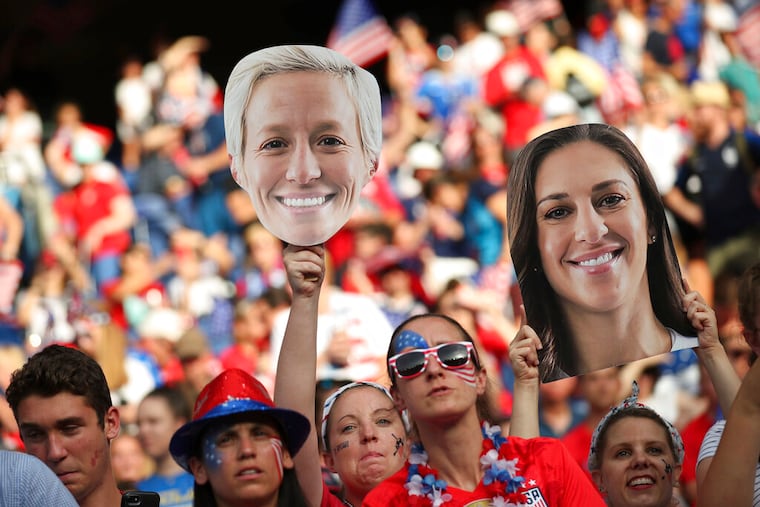U.S. soccer fans vote with their wallets, backing women’s stars at World Cup more than men at Gold Cup
While the U.S. women's soccer team has thousands of fans behind it in France, there is a clear public apathy around the U.S. men right now.

The contrast is impossible to ignore.
For the last three weeks, tens of thousands of American soccer fans have charged across France to roar on the U.S. women’s soccer team at the World Cup. They’ve sold out every stadium they’ve been in, filling Paris’ famed 45,000-seat Parc des Princes to the brim against Chile and out-shouting the majority-French crowd last Friday in one of the all-time spectacles the women’s game has seen.
Then on Sunday, the U.S. men’s team showed up at Lincoln Financial Field for a Gold Cup knockout game, and the lower bowl was barely half full. The crowd for the doubleheader, U.S.-Curaçao and Jamaica-Panama, was 26,233. Both previous Gold Cup doubleheaders at the Linc, in 2007 and 2017, drew more than 31,000.
It didn’t help the box office that Curaçao topped Honduras and El Salvador in the standings. Those two nations played in the past games and brought big fan bases. But Sunday’s tickets started at $30, lower than the exorbitant prices the U.S. Soccer Federation charged for many recent men’s and women’s friendlies.
There have been empty seats at other U.S. games in the tournament, too. Kansas City, a perennial hotbed, didn’t sell out for the group stage finale against Panama, the group’s toughest opponent.
From the stands to social media, there is a clear public apathy around the U.S. men right now. As coach Gregg Berhalter and general manager Earnie Stewart rebuild the program after the 2018 World Cup qualifying failure, the fan base has taken its attention elsewhere.
Part of the problem is that it hasn’t been a true rebuild. Some veterans who were part of the World Cup qualifying failure are still on the team, led by Omar Gonzalez and perennial lightning rod Michael Bradley. Meanwhile, the Americans’ top young striker, Josh Sargent, was omitted from the under-20 World Cup to be on the Gold Cup team and then was left off that, too.
There’s also been controversy on the marketing side. Fox ran graphics on its spring soccer broadcasts putting the World Cup and Gold Cup side by side, an image of equivalence from which the network later backed off. U.S. Soccer has touted glorified men’s scrimmages as being games of consequence, with the aforementioned ticket prices as high as the governing body’s perception.
Berhalter and Stewart don’t make the business decisions, so this isn’t their fault. They’re doing their jobs calmly and patiently, as they’ve said all along they would. In time, they’ll succeed. Hopefully, they’ll be helped by the exciting crop of prospects who won raves for their skill and heart at this year’s under-20 World Cup.
But another Berhalter might have a role to play: Gregg’s brother Jay, the U.S. Soccer Federation’s chief commercial officer. Every major business move the Federation makes comes across his desk, as do a range of other matters. He was on the search committee that hired Stewart, and attended the January NWSL board of governors meeting at which Amanda Duffy was promoted to president.
Jay currently aspires to an even higher job, that of retiring CEO Dan Flynn. The New York Times recently blew the lid off an in-house revolt against attempts to make Berhalter Flynn’s successor. The Washington Post also reported that U.S. Soccer president Carlos Cordeiro is “not aboard” with the effort, although a source with some knowledge of the situation disputes that portrayal.
While a court of law deals with the U.S. women’s team’s gender discrimination lawsuit — with marketing of the team one of the subjects at hand — the court of public opinion has rendered a clear verdict. Fans would rather watch the star-studded and successful women, at least until the men’s team starts playing well again.
That time might come, but it isn’t here now. And if the three-time World Cup champs add a fourth star to their jerseys Sunday, their claim to the spotlight will grow even stronger.